知识点——should的用法大全
- 格式:pdf
- 大小:2.51 MB
- 文档页数:19
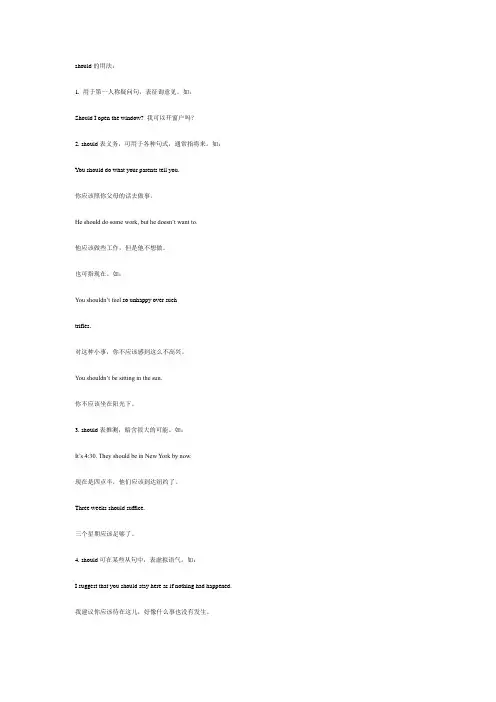
should的用法:1. 用于第一人称疑问句,表征询意见。
如:Should I open the window? 我可以开窗户吗?2. should表义务,可用于各种句式,通常指将来。
如:You should do what your parents tell you.你应该照你父母的话去做事。
He should do some work, but he doesn’t want to.他应该做些工作,但是他不想做。
也可指现在。
如:You shouldn’t feel so unhappy over suchtrifles.对这种小事,你不应该感到这么不高兴。
You shouldn’t be sitting in the sun.你不应该坐在阳光下。
3. should表推测,暗含很大的可能。
如:It’s 4:30. They should be in New York by now.现在是四点半,他们应该到达纽约了。
Three weeks should suffice.三个星期应该足够了。
4. should可在某些从句中,表虚拟语气。
如:I suggest that you should stay here as if nothing had happened. 我建议你应该待在这儿,好像什么事也没有发生。
She was terrified lest they should go on talking about her.她感到害怕,唯恐他们再说她的事。
If he should drop in, give him my message.他若来访,就将我的消息给他。
5. should表感情色彩,常用在以why, how开头的疑问句中。
如:Why shouldn’t you invite him?为什么你不邀请他?I don’t see why we shouldn’t make friends.我不明白为什么我们竟不能成为朋友。
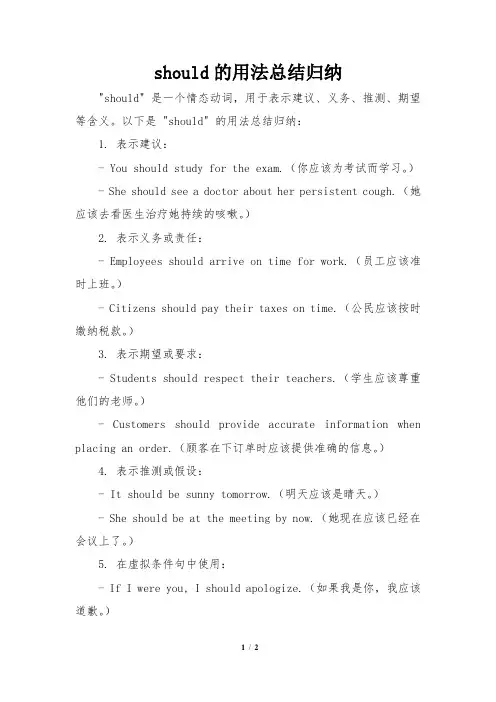
should的用法总结归纳"should" 是一个情态动词,用于表示建议、义务、推测、期望等含义。
以下是 "should" 的用法总结归纳:1. 表示建议:- You should study for the exam.(你应该为考试而学习。
)- She should see a doctor about her persistent cough.(她应该去看医生治疗她持续的咳嗽。
)2. 表示义务或责任:- Employees should arrive on time for work.(员工应该准时上班。
)- Citizens should pay their taxes on time.(公民应该按时缴纳税款。
)3. 表示期望或要求:- Students should respect their teachers.(学生应该尊重他们的老师。
)- Customers should provide accurate information when placing an order.(顾客在下订单时应该提供准确的信息。
)4. 表示推测或假设:- It should be sunny tomorrow.(明天应该是晴天。
)- She should be at the meeting by now.(她现在应该已经在会议上了。
)5. 在虚拟条件句中使用:- If I were you, I should apologize.(如果我是你,我应该道歉。
)1/ 2- He should have called, but he didn't.(他本应该打电话来的,但他没有。
)需要注意的是,"should" 是一种非常正式的用法,较为客观和礼貌。
在口语中,可以使用 "should" 的替代词如 "ought to" 或"need to"。
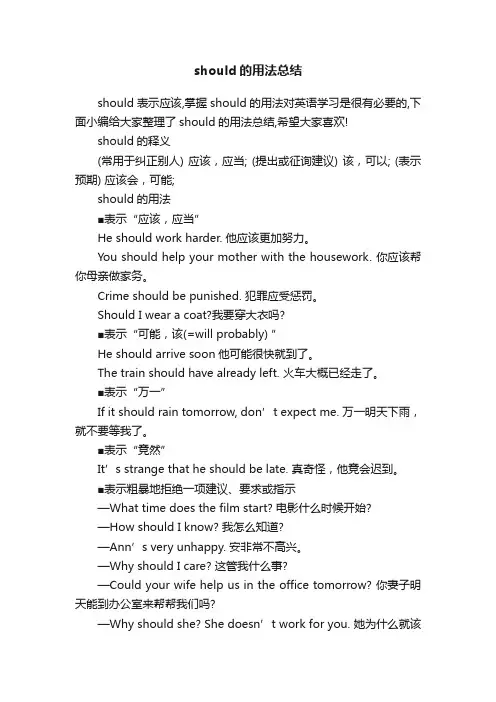
should的用法总结should表示应该,掌握should的用法对英语学习是很有必要的,下面小编给大家整理了should的用法总结,希望大家喜欢!should的释义(常用于纠正别人) 应该,应当; (提出或征询建议) 该,可以; (表示预期) 应该会,可能;should的用法■表示“应该,应当”He should work harder. 他应该更加努力。
You should help your mother with the housework. 你应该帮你母亲做家务。
Crime should be punished. 犯罪应受惩罚。
Should I wear a coat?我要穿大衣吗?■表示“可能,该(=will probably) ”He should arrive soon他可能很快就到了。
The train should have already left. 火车大概已经走了。
■表示“万一”If it should rain tomorrow, don’t expect me. 万一明天下雨,就不要等我了。
■表示“竟然”It’s strange that he should be late. 真奇怪,他竟会迟到。
■表示粗暴地拒绝一项建议、要求或指示—What time does the film start? 电影什么时候开始?—How should I know? 我怎么知道?—Ann’s very unhappy. 安非常不高兴。
—Why should I care? 这管我什么事?—Could your wife help us in the office tomorrow? 你妻子明天能到办公室来帮帮我们吗?—Why should she? She doesn’t work for you. 她为什么就该去? 她又不是为你们工作的。
■should加完成式:should have done表示“本应该做某事,但事实上却没有做”;shouldn’t have done表示“本不该做某事,但事实上却做了”。
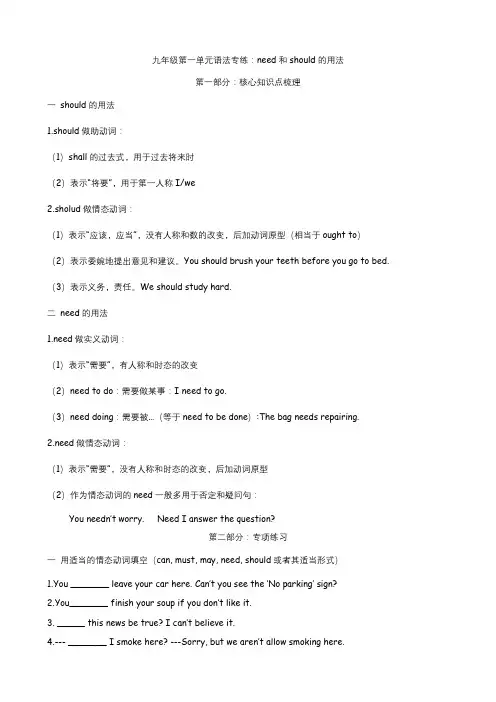
九年级第一单元语法专练:need和should的用法第一部分:核心知识点梳理一should的用法1.should做助动词:(1)shall的过去式,用于过去将来时(2)表示“将要”,用于第一人称I/we2.sholud做情态动词:(1)表示“应该,应当”,没有人称和数的改变,后加动词原型(相当于ought to)(2)表示委婉地提出意见和建议。
You should brush your teeth before you go to bed. (3)表示义务,责任。
We should study hard.二need的用法1.need做实义动词:(1)表示“需要”,有人称和时态的改变(2)need to do:需要做某事:I need to go.(3)need doing:需要被…(等于need to be done):The bag needs repairing.2.need做情态动词:(1)表示“需要”,没有人称和时态的改变,后加动词原型(2)作为情态动词的need一般多用于否定和疑问句:You needn’t worry. Need I answer the question?第二部分:专项练习一用适当的情态动词填空(can, must, may, need, should或者其适当形式)1.You _______ leave your car here. Can’t you see the ‘No parking’ sign?2.You_______ finish your soup if you don’t like it.3. _____ this news be true? I can’t believe it.4.--- _______ I smoke here? ---Sorry, but we aren’t allow smoking here.5.He_______ be the actor, I have seen him on TV.6.I think today’s children_______ learn to respect their elders.7.She_______ swim, but I can’t.8.She said she_______ retire, but she was not sure.9. The clothes _______ washing, they look so dirty.10.You _______ push, there is a lot of room on the bus.二选择( ) 1.We_______build our country into a country of peace and wealth.A mightB shouldC could( ) 2.Dogs _______ run through soccer games at the park. It’s dangerous.A shouldB shouldn’tC needD needn’t( ) 3.To keep children safe, we_______ put the things like knives medicine away in our house.A mayB shouldC canD might( ) 4.Now most young people like shopping online because they_______ spend a lot of time going from shop to shop.A needn’tB can’tC mustn’tD shouldn’t( ) 5.In order to speak English better, we_______ be afraid of failure.A shouldB shouldn’tC have toD could( ) 6.Let’s take a bus, little children _______ tickets.A needn’t buyB needn’t to buyC don’t need buyD needn’t buying( ) 7. —It nearly took me an hour to walk here.—Have a drink, then. You_______be thirsty.A. mustB. shouldC. can( ) 8.—Do you have any plans about this summer vacation?—I_______go to Australia for vacation, but I haven’t decided yet.A. can’tB. mustC. may( ) 9.Please don’t make so much noise. I _______hear what the speaker is saying.A. needn’tB. mustn’tC. can’t( ) 10.—Excuse me, is this the way to the cinema?—Sorry, I’m not sure. But it _______be.A. mustn’tB. mightC. can’t( ) 11.—Mom, must I stay there the whole day?—No, you _______.You _______come back after lunch, if you like.A. mustn’t; canB. needn’t; mustC. needn’t; may( ) 12.—Is that Lucy’s car?—It _______be hers. She has just gone for a meeting.A. can’tB. shouldC. mustn’t( ) 13---Tom, do n’t drive too fast, you _________ hit the others’ cars. ---OK.A.may B.need C must D.have to( ) 14---Must I hand in all my money, Mum?---No, you _________. You can use it to buy some school things.A.mustn’t B.can’t C.needn’t D.should( ) 15---Susan, would you like to go hiking with us this afternoon?---I’d love to, but I _________ study for a test.A.may B.can C.will D.have to三句型1.I must go home now, it’s too late.(变为否定句)___________________________________2.I think he must be an engineer.(变为否定句)___________________________________3.You should finish your homework first.(否定句)___________________________________4.---Need I do the things right now?(做出肯否回答)---________,________ ________.(肯定回答)---________,________ ________.(否定回答)5.-- May I smoke here?---________,________ ________.(否定回答)。
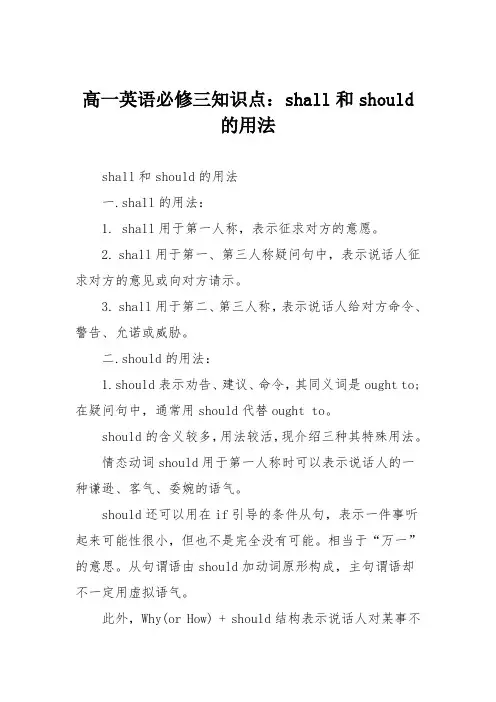
高一英语必修三知识点:shall和should
的用法
shall和should的用法
一.shall的用法:
1. shall用于第一人称,表示征求对方的意愿。
2. shall用于第一、第三人称疑问句中,表示说话人征求对方的意见或向对方请示。
3. shall用于第二、第三人称,表示说话人给对方命令、警告、允诺或威胁。
二.should的用法:
1.should表示劝告、建议、命令,其同义词是ought to;在疑问句中,通常用should代替ought to。
should的含义较多,用法较活,现介绍三种其特殊用法。
情态动词should用于第一人称时可以表示说话人的一种谦逊、客气、委婉的语气。
should还可以用在if引导的条件从句,表示一件事听起来可能性很小,但也不是完全没有可能。
相当于“万一”的意思。
从句谓语由should加动词原形构成,主句谓语却不一定用虚拟语气。
此外,Why(or How) + should结构表示说话人对某事不
能理解,感到意外、惊异等意思。
意为“竟会”。
2. “should + have + 过去分词”结构一般表示义务,表示应该做到而实际上没有做到,并包含一种埋怨、责备的口气。
为同学们整理的关于高一英语必修三知识点,仅供参考。
希望能帮助同学们更多相关内容请点击进入高一英语知识点栏目。
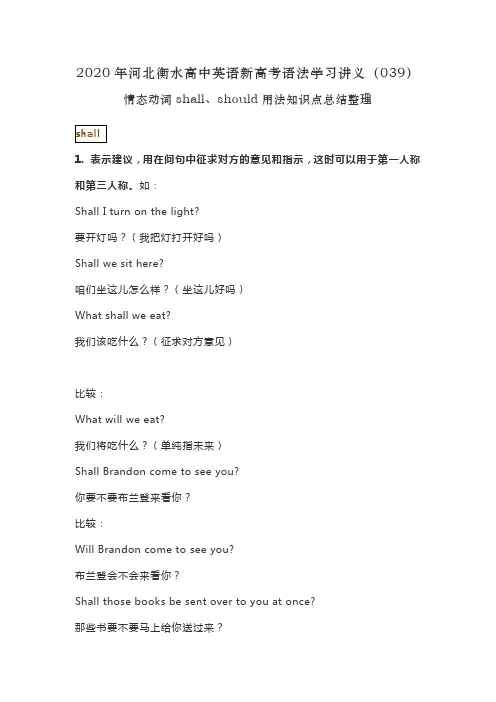
2020年河北衡水高中英语新高考语法学习讲义(039)情态动词shall、should用法知识点总结整理shall1. 表示建议,用在问句中征求对方的意见和指示,这时可以用于第一人称和第三人称。
如:Shall I turn on the light?要开灯吗?(我把灯打开好吗)Shall we sit here?咱们坐这儿怎么样?(坐这儿好吗)What shall we eat?我们该吃什么?(征求对方意见)比较:What will we eat?我们将吃什么?(单纯指未来)Shall Brandon come to see you?你要不要布兰登来看你?比较:Will Brandon come to see you?布兰登会不会来看你?Shall those books be sent over to you at once?那些书要不要马上给你送过来?Shall we begin now?我们现在开始,好吗?Shall I get you some more coffee?我再给您倒点咖啡喝,好吗?例题:—What's the name?—Khulaifi. I spell that for you?A. ShallB. WouldC. CanD. Might【答案选A】Shall I / we...?表示“我/ 我们……好吗?”,通常用来征求对方意见,常用于第一人称。
2. 表示命令,用于陈述句,与第二人称或第三人称连用,表示允诺、命令、警告和强制,或表示说话人的决心等。
如:We shall do what we are told.我们必须要按所吩咐的去做。
You shall not get it so easily next time.你下次就不会轻易得到它。
If you work well,you shall get a chance of promotion.你要是好好干,就有提升的机会。
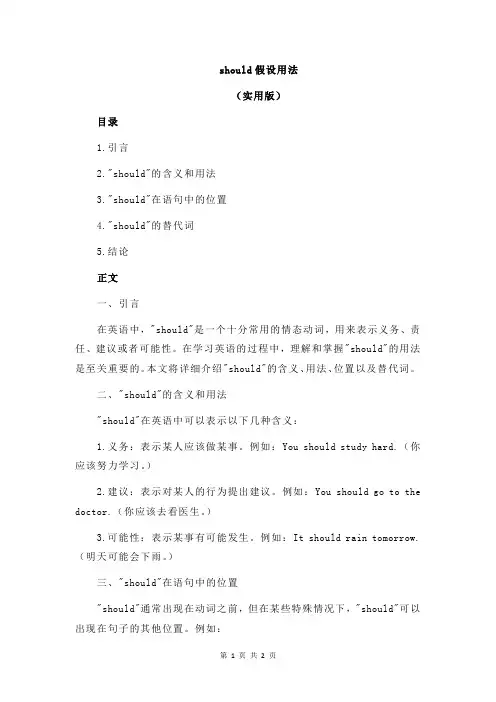
should假设用法(实用版)目录1.引言2."should"的含义和用法3."should"在语句中的位置4."should"的替代词5.结论正文一、引言在英语中,"should"是一个十分常用的情态动词,用来表示义务、责任、建议或者可能性。
在学习英语的过程中,理解和掌握"should"的用法是至关重要的。
本文将详细介绍"should"的含义、用法、位置以及替代词。
二、"should"的含义和用法"should"在英语中可以表示以下几种含义:1.义务:表示某人应该做某事。
例如:You should study hard.(你应该努力学习。
)2.建议:表示对某人的行为提出建议。
例如:You should go to the doctor.(你应该去看医生。
)3.可能性:表示某事有可能发生。
例如:It should rain tomorrow.(明天可能会下雨。
)三、"should"在语句中的位置"should"通常出现在动词之前,但在某些特殊情况下,"should"可以出现在句子的其他位置。
例如:1.在疑问句中,"should"通常放在句首。
例如:Should I go to the party?(我应该去参加派对吗?)2.在否定句中,"should"通常放在句首。
例如:You shouldn"t smoke.(你不应该抽烟。
)四、"should"的替代词"should"可以用其他情态动词或词组来替代,例如:1.替代"should"表示义务:must, have to, be supposed to2.替代"should"表示建议:had better, might as well3.替代"should"表示可能性:might, could五、结论"should"是一个重要的情态动词,在学习和使用英语过程中,我们需要熟练掌握它的含义、用法、位置以及替代词。
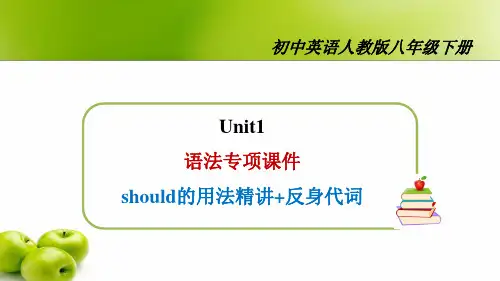
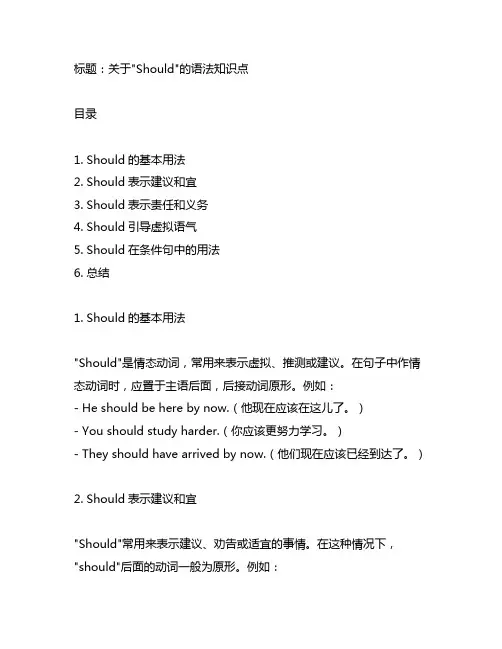
标题:关于"Should"的语法知识点目录1. Should的基本用法2. Should表示建议和宜3. Should表示责任和义务4. Should引导虚拟语气5. Should在条件句中的用法6. 总结1. Should的基本用法"Should"是情态动词,常用来表示虚拟、推测或建议。
在句子中作情态动词时,应置于主语后面,后接动词原形。
例如:- He should be here by now.(他现在应该在这儿了。
)- You should study harder.(你应该更努力学习。
)- They should have arrived by now.(他们现在应该已经到达了。
)2. Should表示建议和宜"Should"常用来表示建议、劝告或适宜的事情。
在这种情况下,"should"后面的动词一般为原形。
例如:- You should take a break.(你应该休息一下。
)- We should start early.(我们应该早点开始。
)- She should see a doctor.(她应该去看医生。
)3. Should表示责任和义务"Should"也可以表示责任和义务,通常用于表示某种道德上的义务或应尽的责任。
例如:- You should apologize for your mistake.(你应该为自己的错误道歉。
)- We should help those in need.(我们应该帮助有需要的人。
)- She should have returned the money.(她本应该把钱退还。
)4. Should引导虚拟语气在虚拟语气中,"should"常用来表示主观的推测或建议。
在这种情况下,"should"后面的动词一般为原形。
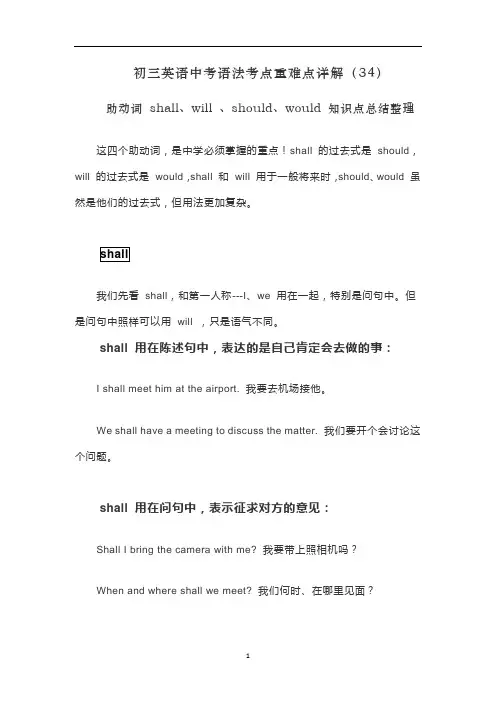
在问句中,我们照样可以用will,但表达的语气是自问或者迷茫,语言是有血有肉的,不要死记规则哦:Will I wait for him ? 我要不要等他呢?Will I be handsome?我将来会很英俊吗?shall 也可以用于其它人称,表示“不可避免”、“一定会”:You shall die. 你死定了!He shall be in prison. 他一定会坐牢。
will可以用于各种人称,表示“将要”,后跟原型动词:He will fly to Tokyo. 他要飞往东京。
Will they have a party? 他们会举办派对吗?因为shall 表达得比will 肯定得多,所以在口语中我们也可以用I will,I'll 更多见,这个缩写的'll,可以认为是对shall 这个词所表达语气的缓和。
I will go with you. 我会和你一起去的。
(很随意)Don't worry. I'll take care. 别担心,我会照顾好的shouldshould 虽然是shall 的过去式,但是它具有更加广泛的用法和意义。
首先,should 可以表示劝告、建议等,表示“应该”,是个情态动词,例如:You should get up right now or you'll be late. 你应该马上起床,否则会迟到的。
I should go swimming tomorrow. 我明天该去游泳。
(语气比shall 强,可能和别人人约好了,有赴约的义务)另外,should 还可以表达一种谦逊的、委婉的语气,常和第一人称连用:I should say, you'd better try again. 依我看呐,你还是再试一次为好。
I should advise you not to do it that way. 我倒是建议你不要那样做。
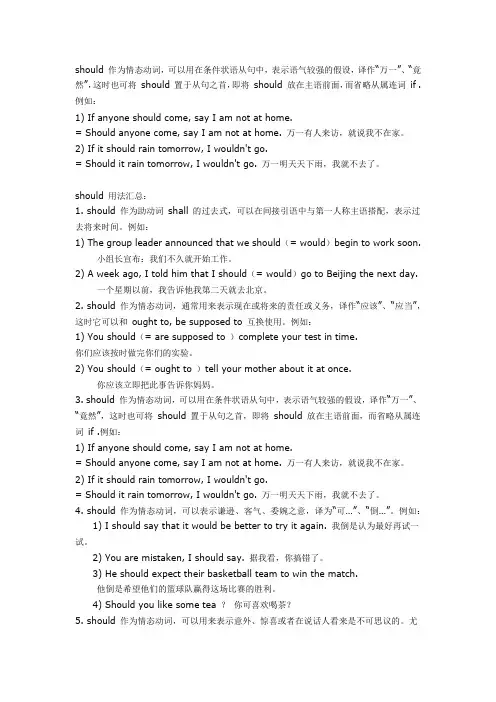
should 作为情态动词,可以用在条件状语从句中,表示语气较强的假设,译作“万一”、“竟然”,这时也可将should 置于从句之首,即将should 放在主语前面,而省略从属连词if .例如:1) If anyone should come, say I am not at home.= Should anyone come, say I am not at home. 万一有人来访,就说我不在家。
2) If it should rain tomorrow, I wouldn't go.= Should it rain tomorrow, I wouldn't go. 万一明天天下雨,我就不去了。
should 用法汇总:1. should 作为助动词shall 的过去式,可以在间接引语中与第一人称主语搭配,表示过去将来时间。
例如:1) The group leader announced that we should(= would)begin to work soon.小组长宣布:我们不久就开始工作。
2) A week ago, I told him that I should(= would)go to Beijing the next day.一个星期以前,我告诉他我第二天就去北京。
2. should 作为情态动词,通常用来表示现在或将来的责任或义务,译作“应该”、“应当”,这时它可以和ought to, be supposed to 互换使用。
例如:1) You should(= are supposed to )complete your test in time.你们应该按时做完你们的实验。
2) You should(= ought to )tell your mother about it at once.你应该立即把此事告诉你妈妈。
3. should 作为情态动词,可以用在条件状语从句中,表示语气较强的假设,译作“万一”、“竟然”,这时也可将should 置于从句之首,即将should 放在主语前面,而省略从属连词if .例如:1) If anyone should come, say I am not at home.= Should anyone come, say I am not at home. 万一有人来访,就说我不在家。
人教版九年级英语第十四单元3a知识点在人教版九年级英语第十四单元的课程中,3a是一个重要的知识点。
这个知识点主要涉及情态动词“should”和“shouldn't”的用法。
下面就让我们一起来学习一下吧!首先,我们要了解“should”和“shouldn't”的基本用法。
这两个情态动词常用来表达建议、劝告或责任感等。
例如,我们可以说:“You should study hard for the exam.”(你应该为考试努力学习。
)这句话的意思是告诉对方他应该努力学习以便在考试中取得好成绩。
相反,当我们对对方的行为感到不满意时,可以使用“shouldn't”。
比如说:“You shouldn't waste your time playing video games.”(你不应该浪费时间玩电子游戏。
)这个句子意味着我们认为对方不应该把时间浪费在玩游戏上。
接下来,我们要掌握一些其他常见的用法。
首先是用“should”表达问句中的建议。
比如说:“What should I do if I have a toothache?”(如果我牙疼,我应该怎么办呢?)这句话是询问对方对牙疼这个问题的建议。
其次是用“should”表达虚拟语气。
例如:“If I were you, I should help him.”(如果我是你,我应该帮助他。
)这个句子表达了一种假设的情况,表示如果我处在你的位置,我会给他帮助。
还有一种常见的用法是用“should”表示意愿或希望。
比如说:“I should like to go shopping this weekend.”(我希望这个周末能去购物。
)这句话表达了说话人对于本周末的购物的愿望。
除了以上几种情况,我们还要了解到“should”在不同句型中的运用。
比如说在虚拟条件句中,我们可以使用“should + 动词的原形”。
例如:“Should you have any questions, please let me know.”(如果你有任何问题,请告诉我。
虚拟语⽓词should的⽤法我们通过⼀下的例句来讲讲虚拟语⽓词should的⽤法:1) It is demanded / necessary / a pity + that…结构中的主语从句的谓语动词要⽤should 加动词原形, should 可省略。
句型: (1) suggestedIt is (2) important that…+ (should) do (3) a pity(1)suggested, ordered, proposed, required, demanded, requested, insisted;+ (should) do(2)important, necessary, natural, strangea pity, a shame, no wonder(3)It is suggested that we (should) hold a meeting next week.It is necessary that he (should) come to our meeting tomorrow.2)在宾语从句中的应⽤ 在表⽰命令、建议、要求等⼀类动词后⾯的从句中。
order, suggest, propose, require, demand, request, insist, command, insist + (should) do I suggest that we (should) hold a meeting next week. He insisted that he (should ) be sent there. 注意:如suggest, insist不表⽰"建议" 或"坚持要某⼈做某事时",即它们⽤于其本意"暗⽰、表明"、"坚持认为"时,宾语从句⽤陈述语⽓。
The guard at gate insisted that everybody obey the rules. 判断改错: (错) You pale face suggests that you (should) be ill. (对) Your pale face suggests that you are ill. (错) I insisted that you ( should) be wrong. (对) I insisted that you were wrong.3)在表语从句,同位语从句中的应⽤ 在suggestion, proposal, idea, plan, order, advice等名词后⾯的表语从句、同位语从句中要⽤虚拟语⽓,即(should)+动词原形。
should表推测的用法"Should"是一个情态动词,用于表示推测或建议。
在英语中,它有多种用法和含义,可以用于不同的语境中。
以下是关于"should"表推测的用法的详细解释:1. 表示推测:当我们根据已有的信息或证据做出合理的推测时,可以使用"should"来表达这种推测。
例如:- She should be at home by now.(她现在应该在家。
)- It should be raining outside.(外面应该在下雨。
)2. 表示建议:"should"也可以用于表示建议或提议。
在这种情况下,它通常用于表达一种礼貌或客气的建议。
例如:- You should see a doctor if you're feeling unwell.(如果你感觉不舒服,你应该去看医生。
)- We should start working on the project as soon as possible.(我们应该尽快开始着手这个项目。
)3. 表示义务或责任:"should"还可以用于表示某种义务或责任。
在这种情况下,它通常用于表达应该做的事情。
例如:- You should apologize for what you said.(你应该为你说的话道歉。
)- We should respect our elders.(我们应该尊重长辈。
)总的来说,"should"是一个非常常用的情态动词,用于表示推测、建议、义务或责任等不同的含义。
在使用时,需要根据具体的语境和意图来选择合适的用法。
希望以上解释对你有帮助!。